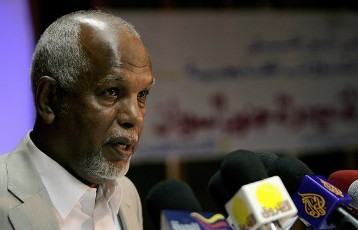South Sudan an ‘enemy state’, Sudanese parliament decides
April 16, 2012 (KHARTOUM) – The Sudanese national assembly on Monday adopted a resolution designating the country’s southern neighbour as an enemy state in the latest sign of escalation between the two sides.

The legislative body’s speaker Ahmed Ibrahim al-Taher also announced that his country wants the ruling party in South Sudan toppled by any means necessary.
“We declare that we will confront the [Sudan People Liberation Movement] SPLM until we end its rule of the South, and will work to gather our resources to realize this aim,” al-Taher said.
“We are in a battle that does not finish with the recovery of Heglig, but with an end to the danger that comes from South Sudan” he added.
It remains unclear what implications the decision will carry as the power to declare war lies with the president according to the constitution. Only then can the parliament endorse it according to the 2005 constitution.
The two countries are now engaged in what some observers now classify as a full blown war since last Tuesday when South Sudan’s army occupied the oil-rich region of Heglig in South Kordofan State.
The surprise occupation reignited claims made by South Sudanese officials that Heglig is part of their country and specifically Unity State.
The oilfield is vital to Sudan’s economy, producing about half of the 115,000 barrel-per-day output that remained in its control after South Sudan’s secession.
Juba’s move drew wide international condemnation but has yet to convince Juba to initiate a withdrawal. South Sudan laid out a set of conditions for that including stopping aerial bombardments, withdrawing Sudan Armed Forces (SAF) from Abyei and Khartoum pledging not to use Heglig as a base to attack South Sudan.
As an alternative, South Sudan suggested the deployment of UN peacekeepers in Heglig.
Sudanese president Omer Hassan al-Bashir told the visiting Egyptian foreign minister Mohamed Kamel Amr this week that there will be no negotiations without a withdrawal.
The Sudanese parliament also approved a formal response to minister of defense’s testimony last week in which it called for a clear national strategy in dealing with South Sudan, strengthening internal front, supporting the armed forces, conducting dialogue with non-SPLM political powers in South Sudan, announcing comprehensive mobilisation and amending the country’s budget.
The response also reiterated the suspension of all negotiations except for military ones aimed at expelling South Sudan from the occupied territories.
The national assembly also stressed that the term “Liberation of Sudan” should never be used in connection with the name of any political organisation as it will be considered a hostile act.
In the Southern capital Juba, Information Minister Barnaba Marial Benjamin said the vote by Sudan’s parliament was “unfortunate”.
“We have never been their enemy — our position is that we don’t consider them as our enemy,” he told reporters.
(ST)
Al Jazeera English | Sudan calls government of South an ‘enemy’ | 16 April 2012
Sudan’s parliament has branded South Sudan’s government an “enemy” and called for a swift recapture of a disputed oil-producing region. Al Jazeera’s Charles Stratford reports.
